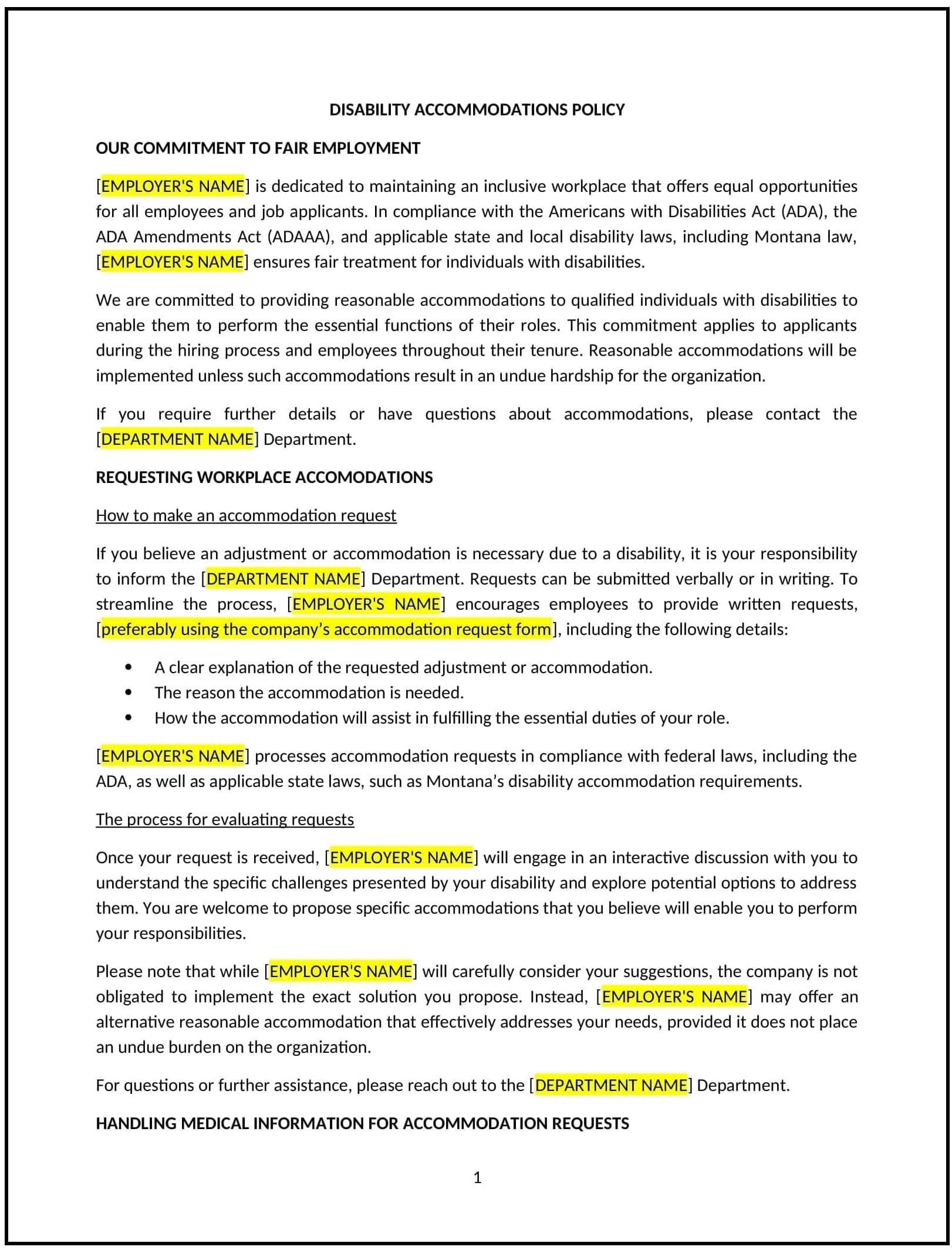Disability accommodations policy (Montana): Free template
Got contracts to review? While you're here for policies, let Cobrief make contract review effortless—start your free review now.

Customize this template for free
Disability accommodations policy (Montana)
A disability accommodations policy helps Montana businesses create an inclusive work environment by outlining how employees with disabilities can request accommodations to perform their job duties effectively. The policy specifies the process for requesting accommodations, the types of accommodations available, and how businesses can support employees with disabilities while maintaining operational efficiency.
By implementing this policy, businesses can promote diversity, comply with legal requirements, and foster a culture of inclusivity and support for all employees.
How to use this disability accommodations policy (Montana)
- Define eligibility and scope: Businesses should specify who is eligible for accommodations under the policy, including full-time, part-time, and temporary employees. The policy should clearly define what constitutes a disability under state and federal law.
- Outline the accommodation request process: Businesses should establish a clear, confidential process for employees to request accommodations, including how to submit a request, what information is required, and the timeline for processing the request.
- Specify the types of accommodations: Businesses should list the types of accommodations that may be provided, such as modified work hours, assistive devices, accessible workspaces, or changes to job duties, depending on the needs of the employee and the nature of their disability.
- Set guidelines for evaluating requests: Businesses should establish a process for evaluating accommodation requests based on feasibility, cost, and the impact on the business. Each request should be assessed individually to determine reasonable accommodations.
- Address confidentiality and privacy: Businesses should ensure that all medical information related to disability accommodations is kept confidential and shared only with authorized personnel involved in the accommodation process.
- Establish a communication plan: Businesses should ensure ongoing communication with employees to assess the effectiveness of accommodations and make adjustments if necessary.
- Review and update regularly: Businesses should periodically review the policy to ensure it reflects current legal standards, business practices, and employee needs.
Benefits of using this disability accommodations policy (Montana)
This policy provides several key benefits for Montana businesses:
- Promotes an inclusive work environment: A clear policy helps employees with disabilities feel supported and valued within the workplace.
- Reduces legal risks: By following a structured process for accommodating employees with disabilities, businesses can mitigate the risk of legal disputes and discrimination claims.
- Increases employee satisfaction and retention: Employees who receive the accommodations they need are more likely to remain engaged and productive in their roles.
- Enhances workplace diversity: A well-implemented policy helps businesses attract and retain a diverse workforce by supporting employees with different abilities.
- Supports compliance with legal requirements: This policy helps businesses comply with state and federal laws, such as the Americans with Disabilities Act (ADA) and Montana state disability laws.
- Improves overall productivity: Employees who receive appropriate accommodations can perform at their best, benefiting both the employee and the organization.
Tips for using this disability accommodations policy (Montana)
- Communicate the policy effectively: Ensure that employees are aware of the accommodations available to them and how to request assistance in a timely and confidential manner.
- Provide training for managers: Supervisors should be trained on how to handle accommodation requests professionally and respectfully, ensuring that all employees are treated fairly.
- Assess each request individually: Businesses should evaluate each accommodation request on a case-by-case basis, considering the specific needs of the employee and the nature of their disability.
- Be flexible and proactive: Businesses should be open to discussing accommodations with employees and offer flexibility in implementing solutions that allow employees to perform their duties effectively.
- Keep records: Maintain documentation of accommodation requests, decisions, and any accommodations provided to ensure transparency and accountability.
- Regularly review the policy: Assess the effectiveness of the policy, gather feedback from employees, and make adjustments to ensure it meets the needs of all employees.